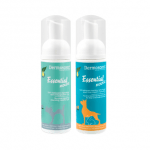
Recently, across the United States, winter weather systems brought large amounts of snowfall, sleet, ice, and extreme cold, impacting many of our travel plans and daily lives. This is no exception for our furry friends. At VetRxDirect, we carry products to help protect and ensure your pets are happy and healthy throughout the year, including the harsh winter.
One common thing we forget about our pets during the cold winter months is the health of their paws. Wearing dog boots or paw protectors works well to keep their paws safe from possible abrasions from walking on ice or stepping on sand on sidewalks. However, if you have a dog like mine who does not care for boots, cleaning their feet is essential. online loans. During the winter, deicing substances are often littered throughout city streets and sidewalks including sodium chloride and other toxic chemicals, which can irritate the paws of your pets. ASCPA recommends cleaning your dog’s feet with a damp towel and towel dry after including the legs and stomach, which are places where these chemicals and substances may linger. Similar to us, dogs may also benefit from the use of petroleum jelly or balm for their paws or a moisturizer for dry skin.

One balm product that we carry at VetRxDirect is Demoscent Bio Balm. This is a fragrance-free product that moisturizes dry, cracked skin and protects exposed skin areas, including paw pads, nose, and elbows, from the harsh effects of winter. Furthermore, Dermoscent produces an Essential Mousse, which is a no-rinse cleansing foam for dogs and cats that deodorizes and gently cleans, which makes it ideal for removing the deicing material and harsh chemicals found on streets and sidewalks. This product is made from all-natural ingredients that include fatty acids from hemp oil to hydrate the skin and help support the natural skin barrier. Lastly, to protect your pet’s skin and coat during the winter, Dermoscent Essential 6 Spot On. This all-natural topical treatment consists of a hydrating blend of fatty acids and 10 essential oils to hydrate irritated skin and help the coat shine on dogs and cats while leaving a great scent. Dermoscent skin care products are great for everyday pets, including those who enjoy some time in the snow. Learn more about winter skincare with Dermoscent. If you have a dog that enjoys substantial time outside in the winter, Pad-Tough is a topical spray that provides a protective covering and works to toughen the skin of the foot pads and elbows on your dog.
VetRxDirect has a wide selection of prescription and over-the-counter products for pets. Continue to follow our blog for more helpful tips and tricks to care for your furry friends and help them live their best lives!
About the Author

“My dog’s name is Tibbers. He is a three year old Pomsky who enjoys nibbling on snowballs and sleeping anywhere that is cold. His favorite spot to sleep during the winter is near our sliding doors since it is extra chilly.”
–Tin Tran, B.A. PharmD Candidate 2024, University of Iowa College of Pharmacy
This information is not intended to diagnose or treat any disease and is purely educational. Please seek advice from your pet’s veterinarian with any questions regarding your pet’s health.















 O3 Omega features high potency essential fatty acids EPA and DHA from wild-caught fish oil. It includes vitamins A, D, and E. It helps promote healthy skin and coat as well as immune and joint health. Giving O3 Omega to your dog or cat is easier since it comes in a variety of options including capsules, clip tips, liquid, soft chews, and mini bites.
O3 Omega features high potency essential fatty acids EPA and DHA from wild-caught fish oil. It includes vitamins A, D, and E. It helps promote healthy skin and coat as well as immune and joint health. Giving O3 Omega to your dog or cat is easier since it comes in a variety of options including capsules, clip tips, liquid, soft chews, and mini bites.

 bacteria, yeast, and fungi, which stick themselves together with a slimy substance. Biofilms can be found wherever bacteria like to hang out like pet bowls, sinks, bathrooms, kitchens, etc. The slime-like substance of a biofilm also acts as a barrier to protect the bacteria allowing them to grow, reproduce, and thrive on whatever surface they have taken up residence. Learn
bacteria, yeast, and fungi, which stick themselves together with a slimy substance. Biofilms can be found wherever bacteria like to hang out like pet bowls, sinks, bathrooms, kitchens, etc. The slime-like substance of a biofilm also acts as a barrier to protect the bacteria allowing them to grow, reproduce, and thrive on whatever surface they have taken up residence. Learn 








